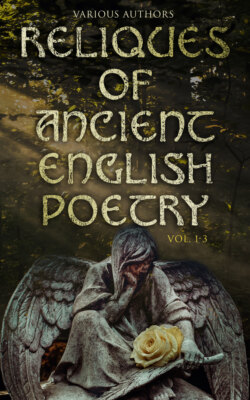Читать книгу Reliques of Ancient English Poetry (Vol. 1-3) - Various Authors - Страница 41
На сайте Литреса книга снята с продажи.
IX.
AN ELEGY ON HENRY FOURTH EARL OF NORTHUMBERLAND.
ОглавлениеTable of Contents
The subject of this poem, which was written by Skelton, is the death of Henry Percy, fourth earl of Northumberland, who fell a victim to the avarice of Henry VII. In 1489 the parliament had granted the king a subsidy for carrying on the war in Bretagne. This tax was found so heavy in the North, that the whole country was in a flame. The E. of Northumberland, then lord lieutenant for Yorkshire, wrote to inform the king of the discontent, and praying an abatement. But nothing is so unrelenting as avarice: the king wrote back that not a penny should be abated. This message being delivered by the earl with too little caution, the populace rose, and, supposing him to be the promoter of their calamity, broke into his house, and murdered him, with several of his attendants, who yet are charged by Skelton with being backward in their duty on this occasion. This melancholy event happened at the earl's seat at Cocklodge, near Thirske, in Yorkshire, April 28, 1489. See Lord Bacon, &c.
If the reader does not find much poetical merit in this old poem (which yet is one of Skelton's best), he will see a striking picture of the state and magnificence kept up by our ancient nobility during the feudal times. This great earl is described here as having, among his menial servants, knights, squires, and even barons: see v. 32. 183. &c. which, however different from modern manners, was formerly not unusual with our greater barons, whose castles had all the splendour and offices of a royal court before the laws against retainers abridged and limited the number of their attendants.
John Skelton, who commonly styled himself Poet Laureat, died June 21, 1529. The following poem, which appears to have been written soon after the event, is printed from an ancient MS. copy preserved in the British Museum, being much more correct than that printed among Skelton's Poems in bl. let. 12mo. 1568.—It is addressed to Henry Percy, fifth earl of Northumberland, and is prefaced, &c. in the following manner:
Poeta Skelton Laureatus libellum suum metrice alloquitur.
Ad dominum properato meum mea pagina Percy,
Qui Northumbrorum jura paterna gerit,
Ad nutum celebris tu prona repone leonis,
Quæque suo patri tristia justa cano.
Ast ubi perlegit, dubiam sub mente volutet
Fortunam, cuncta quæ male fida rotat.
Qui leo sit felix, & Nestoris occupet annos;
Ad libitum cujus ipse paratus ero.
[Percy does not do justice to Skelton's poetical powers in the above note, as this Elegy is written in a style not at all characteristic of him and is also far from being one of his best poems. Skelton was one of the earliest personal satirists in our language, and he flew at high game when he attacked the powerful Wolsey with fierce invective, in his "Why come ye nat to courte?" His Boke of Phyllyp Sparrowe is described by Coleridge as "an exquisite and original poem," and its subject entitles him to the designation of the modern Catullus. It was very popular in his day, and the nursery rhyme of Who killed Cock robin? was probably paraphrased from the portion of the poem in which the funeral of the sparrow is related. Skelton was a distinguished scholar and his earlier poems are written in the serious strain of the Elegy, but curiously enough about the time that he took orders (1498) and became rector of Diss in Norfolk, he began to write in a more natural, frolicsome and satirical vein, and adopted the metre now known as Skeltonian. He was not very particular as to the words he used, but he does not deserve the opprobrious epithet that Pope applies to him in the couplet—
"Chaucer's worst ribaldry is learned by rote,
And beastly Skelton heads of houses quote."
Skelton graduated as poet laureate at the two Universities of Oxford and Cambridge, and the King allowed him to wear an appropriate decoration at court. There is a full length portrait of the poet in Brydges' British Bibliographer (vol. iv. p. 389), taken from one on the back of the title of A ryght delectable tratyse upon a goodly Garlande or Chaplet of Laurell by Mayster Skelton, Poete laureat.
The Rev. Alexander Dyce published the first complete collected edition of Skelton's Poetical Works in 1843 (2 vols. 8vo.)]
